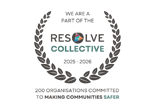Since 2020 BCHA has been on a Coproduction journey with Mike Knowles being appointed as Peer Mentor Development Worker in Exeter and then becoming Coproduction Lead for the organisation in March of this year. Initially, the post aimed to develop a peer mentoring project and support Coproduction across the organisation through the recruitment of people with lived experience of homelessness. Now this role has developed as BCHA recognises that the most powerful way for people with lived experience to create a lasting difference is through directly influencing the design and delivery of policy and services.
"Imagine having some of the most important decisions of your life entirely in someone else’s hands. That’s how it is for so many people when trying to have their most basic needs met. ‘Doing to’ can equal trauma, but ‘Doing with’ i.e. coproduction with someone with lived experience - can be emancipatory. If we don’t want to re-traumatise, we need to work with people"- Mike Knowles, BCHA Coproduction Lead
Involving customers in planning new services and initiatives helps ensure they are designed to meet the needs and preferences of people affected by multiple disadvantage. Customers provide a powerful and authentic voice and unique insights that can challenge assumptions and motivate organisations to do things differently.Therefore, when services are genuinely co-produced with customers they work better because they make the most of the shared expertise of people who work in the service and the people who have lived experience of using them.
BCHA's Coproduction Lead, Mike Knowles, shares the sucesses of BCHA's journey with Coproduction and the difference this is making for customers across our services and homes:
Peer Mentoring
We recruited 6 Peer Mentor volunteers in Exeter and had peer advocacy training in October 2020 and peer mentor training in early February 2021. The Peer Mentors have access to in house online training and other mandatory in-person training offers to equip them for the role. They also attended Reflective Practice sessions for peer support and we developed a menu of opportunities to involve service-users for whom it would not be appropriate to be a Peer Mentor (i.e. with one-to-one/lone working), currently we have an Expert Panel, Talk Shows and there is intent to help co-deliver a training offer for staff and the people we work with. The peer mentor offer will be rolled out to other service specific BCHA services too.
Reference Panel (Expert Panel)
An Expert Panel, with members recruited from the BCHA Supported Housing discusses and informs the work of BCHA and contribute to the wider debate around homelessness. It gives the point of view of people with lived experience of homelessness and ensures that their perspective is used to shape and drive change at BCHA and influence decision making in the delivery of services. Panel members must have the ability to talk about their ‘lived’ experience in an open and honest way and the ability to support others when they talk about themselves and their experiences. Given the success of our Expert Panel, we will be rolling out this offer to other BCHa services. The impact an Expert Panel can have includes:
-
The voices of people who have experienced homelessness are included in the planning and policy process
-
People who are marginalised have strengths and assets that must be acknowledged in policy making
-
People with lived experience can offer local solutions that would work in their community
-
Those who experience homelessness can feel powerless and are sometimes not taken seriously by those in society who hold ‘power’ – being a member of an Expert Panel can provide a starting point for turning those dynamics around and empowering people
-
People with lived experience of homelessness can provide strength to a cause
-
Expert Panels provide a forum for peers to interact, reducing isolation and support personal growth
People Library Talk Shows
We also felt that a more interesting and engaging approach would be to begin to open up conversation through hosting Talk Shows. The Talk Shows take place with people with lived experience and involve regular instalments using themes as determined by them; for example, Hidden Homelessness.
The Talk Show setting allows for greater anonymity of participants, as opposed to video, and once recorded can be made available across our organisation, social media channels and platforms like Spotify so that user voice is heard where it is needed.
Training
The 6 BCHA peer mentors in Oct 2020 were invited to attend peer advocacy training organised by the Exeter Homeless Partnership and delivered by Groundswell. The BCHA Peer Mentor project subsequently aligned itself with the Exeter Homeless Partnership. This provided a more comprehensive, joined up offer to people using homelessness services and helped to empower the group of volunteers to deliver a wide ranging offer which addresses the lack of meaningful involvement of people using homelessness services in Exeter. Joining with other services to help deliver a holistic approach to local challenges is crucial – the group becomes more representative and you can ensure that you recruit from a more diverse, representative and inclusive population. Other training opportunities also included in-house online and in-person training to aid and progress personal and professional development.
Future Developments
As BCHA look to the future, the organisation would like to develop a new stretic body comprising of customers and staff with the aim of blurring and removing distinctions between professionals and recipients, and between producers and consumers of services. We would also like to expand the the peer mentor offer and Expert Panel across other BCHA's services to inform service design and customer outcomes. Other Coproduction goals for BCHA include delivering Coproduction training both internally and externally and recruiting Board Members with lived experience of homelessness to ensure representation throughout BCHA at key strategic levels.
Ultimately, BCHA look forward to utilising and sharing the power of Coproduction to develop the services that people want for better outcomes and building stronger communities.









